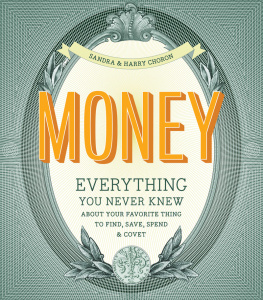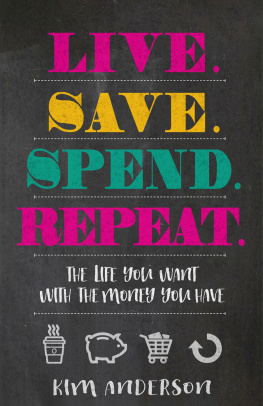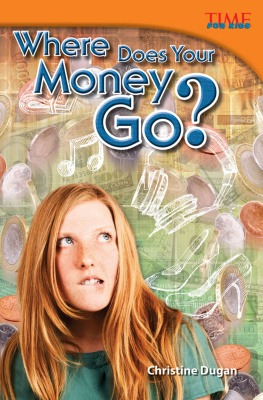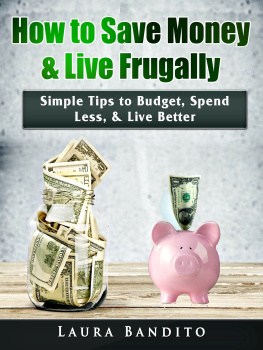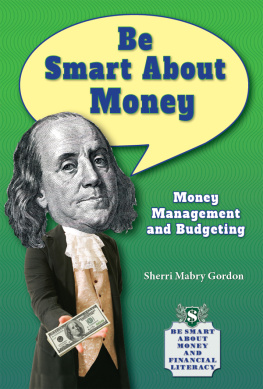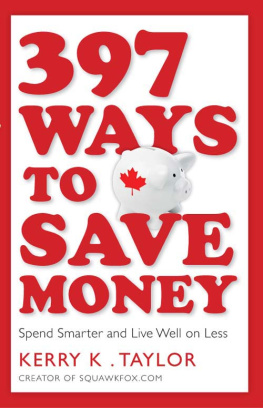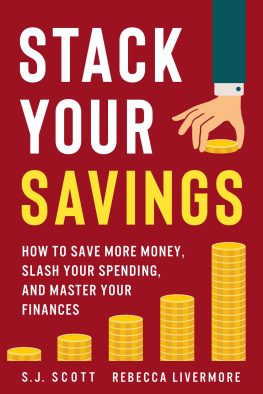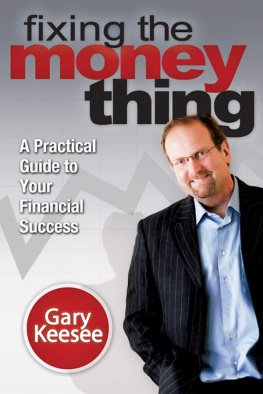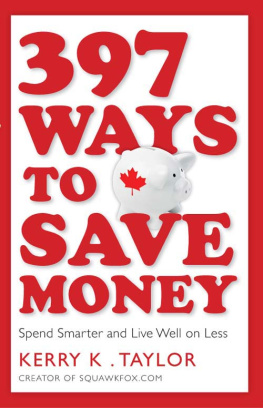Sandra Choron - Money: Everything You Never Knew About Your Favorite Thing to Find, Save, Spend & Covet
Here you can read online Sandra Choron - Money: Everything You Never Knew About Your Favorite Thing to Find, Save, Spend & Covet full text of the book (entire story) in english for free. Download pdf and epub, get meaning, cover and reviews about this ebook. year: 2011, publisher: Chronicle Books, genre: Science. Description of the work, (preface) as well as reviews are available. Best literature library LitArk.com created for fans of good reading and offers a wide selection of genres:
Romance novel
Science fiction
Adventure
Detective
Science
History
Home and family
Prose
Art
Politics
Computer
Non-fiction
Religion
Business
Children
Humor
Choose a favorite category and find really read worthwhile books. Enjoy immersion in the world of imagination, feel the emotions of the characters or learn something new for yourself, make an fascinating discovery.
- Book:Money: Everything You Never Knew About Your Favorite Thing to Find, Save, Spend & Covet
- Author:
- Publisher:Chronicle Books
- Genre:
- Year:2011
- Rating:3 / 5
- Favourites:Add to favourites
- Your mark:
- 60
- 1
- 2
- 3
- 4
- 5
Money: Everything You Never Knew About Your Favorite Thing to Find, Save, Spend & Covet: summary, description and annotation
We offer to read an annotation, description, summary or preface (depends on what the author of the book "Money: Everything You Never Knew About Your Favorite Thing to Find, Save, Spend & Covet" wrote himself). If you haven't found the necessary information about the book — write in the comments, we will try to find it.
Sandra Choron: author's other books
Who wrote Money: Everything You Never Knew About Your Favorite Thing to Find, Save, Spend & Covet? Find out the surname, the name of the author of the book and a list of all author's works by series.
Money: Everything You Never Knew About Your Favorite Thing to Find, Save, Spend & Covet — read online for free the complete book (whole text) full work
Below is the text of the book, divided by pages. System saving the place of the last page read, allows you to conveniently read the book "Money: Everything You Never Knew About Your Favorite Thing to Find, Save, Spend & Covet" online for free, without having to search again every time where you left off. Put a bookmark, and you can go to the page where you finished reading at any time.
Font size:
Interval:
Bookmark:

For our parents,
Kalman & Fay Samelson and
Morris & Sonia Choron,
who taught us values
T he love of it is the root of all evil, yet it makes the world go round. Most of us never seem to have enough of it, and we disdain those who do. (If you want to know what God thinks of money, quipped Dorothy Parker, just look at who he gave it to.) It permeates every aspect of our existence, yet its considered an inappropriate subject in polite conversation. We claim that it cant buy happiness, but Donald Trumps perpetual smirk belies the point, and of the 685,000 books available on the subject, just about all of them pretty much focus on how to get your hands on more of it. This book is the exception.
Instead, were looking at money from all of its anglesthe historical, the cultural, the personal, and the off-the-wall. Money is at the center of our lives. We spend more time pursuing money than we spend on any other activity. It keeps us up at night, busy during the day, and (too) often accounts for how we define ourselves. Yet the fact is that most of us fear money for the simple reason that we dont understand it.
Money isa hugely emotional, psychological, and symbolic entity in our lives, says psychotherapist Kate Levinson, Ph.D., in her Emotional Currency workshops. We each bring our own meanings, emotions, and experiences to our relationship with it. Yet facing our fears of it and learning how it works can reveal more to us than the mechanics of money. Its an incredibly good vehicle for seeing our issues and vulnerabilities because it touches on almost all aspects of life and it reveals deep parts of our psyches, including our needs, fears, and desires, says Levinson. Thus, in learning about money, we learn about ourselves.
The lessons come not a moment too soon. At the time of this writing, the world has been plunged into an economic recession that has affected every aspect of our society. As faith in the workings of the government are eroded, now more than ever we each need to take responsibility for our well-being and for our futures. At the very least, we need to make peace with money. Learning about how it came to be, what it means, how it works, and what happens when it doesnt is a good first step in that direction.
Information about money has become almost as important as money itself.Walter Wriston, former chair and CEO of Citicorp/Citibank
OLD MONEY
B efore there was money, there was chocolateand corn kernels and knives and even pigs feet. It was from these early forms that money as we know it was born, and it was from these humble beginnings that money changed the worldby making commerce, wars, religion, and even civilization possible. The centerpiece of this chapter is a timeline that follows money from the lumps of metal that were once used as currency to the sophisticated works of art produced by so many countries today. The economists who created theories that are still useful today, the first bankers, and the scoundrels who spawned the counterfeiting industry are just some of the characters we will meet along the way. The body of art and literature, as well as proverbs and superstitions, that grew up around the subject of money, is represented here as well.
Whats notable is that despite the trouble that money has causedthe wars, the greed, the class struggles, and human sufferingwe nonetheless pursue it at all costs. Humans have found many ways to bring order to theflow of our existence, says Jack Weatherford in his classic work The History of Money, and money is one of the most important.
This chapter proves, beyond a shadow of doubt, that money does indeed change everything.
We can only imagine the origins of a barter system and the problems it presented. At its best, someone with more chickens than he knew what to do with could make a trade with someone down the road who had too many cows. Before money was created, the system was useful. But what if the whole county was overrun with chickens and you found that you couldnt even give the damn things away? Even if you did manage to locate a buyer, how did you go about making change if all he had was one measly blanket to trade? Our entire system of money was invented to solve these and other problems. This timeline shows how these were solvedand how many other difficulties were created by the development of money.
Even before money is invented, banking originates in Babylonia out of the activities of temples and palaces, which provide safe places for the storage of valuables. Initially, deposits of grain are accepted and later other goods, including cattle, agricultural implements, and precious metals, are stored in banks.
A code of law is issued by Hammurabi, who rules Babylon during this period. For the first time, specific values are ascribed to property, as the code addresses the subjects of loans, theft, land-leasing, and debt.
The earliest record of cowrie shells being used as money. The practice began in China, where the shells were found in the Pacific and Indian Oceans. Their use spreads as the Chinese begin to trade with other countries. Cowries were still in use in Nigeria until World War II.
China points the way to metal money by instituting the use of metal knives and spades as money. They also begin to make metal copies of the cowrie shells but soon discover that lumps of metal are easier to produce than the faux shells. Thus the first coins are produced. They are round, with holes in the middle so that they can be strung and easily carried to market.
As people begin to travel more widely and trade with other countries, the idea of money begins to spread. The earliest coins, found in Lydia, part of present-day Turkey, are round pieces of metal that are stamped with the faces of gods and emperors. By 550 B.C., they are made of gold and silver. Greeks and Romans, who also use bronze for minting, soon follow suit, and coins appear in different values.
The Gauls attack Rome, but the cackling of geese in the capitol, where the citys reserves of money are kept, alerts the Romans, who later build a shrine to Juno Moneta, the protector of funds. The words money and mint are derived from her name.
The Romans finally adopt coinage to replace the cumbersome bronze bars (called aes signatum) that have been commonly used as currency.
To fund the Second Punic War between Rome and Carthage, Roman rulers reduce the weight and purity of their coins, and one of the earliest periods of inflation ensues.
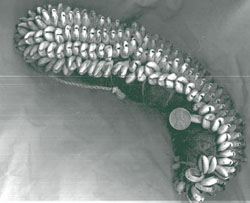
A bracelet of cowrie shells
China is the first to use paper money, in the form of a 30-centimeter square of white deerskin. Society soon learns that the value of money depends on how much of it is available, as those in financial need simply manufacture more by killing more deer. This lesson in inflation leads to the greater popularity of gold and silver coins.
Augustus Caesar reforms the Roman monetary system by introducing coins made of almost-pure gold, silver, copper, and brass.
Nero copies the practice of other emperors by debasing gold and silver coinage, and prolonged inflation results. By A.D. 250, the silver in Roman coins is down to 40 percent of its original silver content; by 270, it has fallen to 4 percent.
Font size:
Interval:
Bookmark:
Similar books «Money: Everything You Never Knew About Your Favorite Thing to Find, Save, Spend & Covet»
Look at similar books to Money: Everything You Never Knew About Your Favorite Thing to Find, Save, Spend & Covet. We have selected literature similar in name and meaning in the hope of providing readers with more options to find new, interesting, not yet read works.
Discussion, reviews of the book Money: Everything You Never Knew About Your Favorite Thing to Find, Save, Spend & Covet and just readers' own opinions. Leave your comments, write what you think about the work, its meaning or the main characters. Specify what exactly you liked and what you didn't like, and why you think so.

